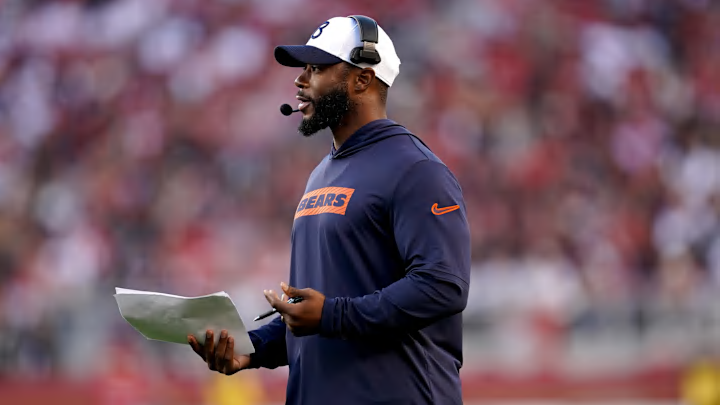Thomas Brown Says Bears Weren't Confused During Puzzling Late-Game Sequence

Just a month after some questionable late-game decisions in a Thanksgiving Day game loss to the Detroit Lions resulted in the firing of former Chicago Bears coach Matt Eberflus, the club was defeated 6-3 on Thursday night by the Seattle Seahawks, and was once again beset by a series of puzzling late-game decisions.
Chicago, trailing by three points with a full complement of timeouts, faced a fourth-and-1 from its own 39-yard-line with 2:14 remaining in the game when the Seahawks utilized a timeout. Fourth-and-1 quickly became fourth-and-6 after the Bears were flagged for a false start, and Bears interim coach Thomas Brown sent out the punting unit, only to call a timeout moments later, even though the clock was already stopped. The Bears' offensive unit then came back out onto the field after the timeout.
When asked about the decision to burn the timeout, Brown denied that confusion played a role, explaining instead that he had "changed his mind".
"It wasn't confusion at all," Brown said. "I just changed my mind. I think being able to use [punter] Tory [Taylor] as a weapon, and we still had, I think it was, 2:16 on the clock, still had our three timeouts, plus the two-minute warning. The way our defense had been playing all day, possibly have a chance to go flip the field and force the three-and-out, get a shorter field and have, like, a last end-of-the-game drive. That was my thought process."
"Over the course of that, I changed my mind and said, 'Let's go for it now,' and sent the offense back on the grass."
Brown's change of heart proved to be fruitful, at least at first, as Chicago picked up the first down on a 14-yard completion from Caleb Williams to wide receiver D.J. Moore. But a seeming lack of urgency plagued the Bears on the ensuing sequence after the two-minute warning.
The Bears gained a yard on a Williams-to-Moore completion, then another 15 yards on a Williams pass to rookie wideout Rome Odunze. There was just one problem.
Chicago allowed 45 seconds to tick off the clock between completions, then declined to use a timeout before running a first down play from the Seahawks' 40-yard line, which resulted in an incompletion.
With the clock stopped and 31 seconds remaining, Chicago elected to use its second timeout.
Williams then fired a pair of incompletions before throwing a game-sealing interception.
The rookie QB explained to reporters that he was hit on the throat by a Seattle defender following his completion to Odunze, but that he was unsure if the coaches saw this occur.
Moore, perhaps in a damning moment of clarity, shared his view of the Bears' late-game decision-making.
"There were some wrinkles in there," Moore said. "The one time that it went all the way down and we really didn't know what to do. But at the end of the day, shoot, that's on us. We've got to stay prepared throughout the whole game, and, I mean, that's all I can say."
Chicago fell to 4-12 after the loss to Seattle.
More of the Latest Around the NFL
feed
